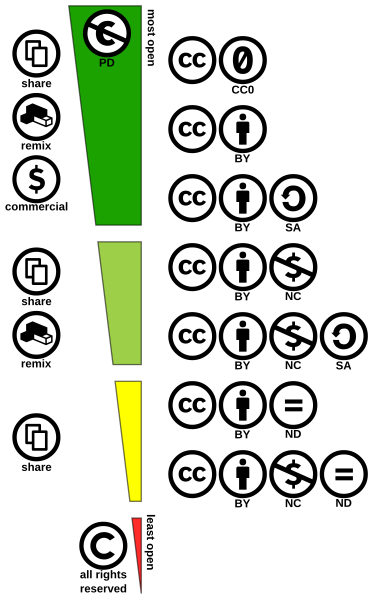
Michael Schwartz Library


This research guide is licensed under a Creative Commons Attribution-ShareAlike 4.0 International License. The authors are Ben Richards and Mandi Goodsett. Third party content including, but not limited to, images and linked items are subject to their own license terms.
Have questions?
Feel free to ask your Personal Librarian, or you can reach out to Mandi Goodsett, CSU's librarian with a specialization in OERs.
You may also wish to consult the Affordable Learning @ CSU website for more details.
Are you using a Creative Commons video, image, or document and need to properly cite it? While the rules may be slightly different depending on the citation style you're using, you'll need at least these basic components.
“Creative Commons Licensing” by Mandi Goodsett, licensed under a CC-BY-SA 4.0 license.
Here's the same citation with the links written out.
“Creative Commons Licensing” (https://tinyurl.com/ybky9tkp) by Mandi Goodsett licensed under a CC-BY-SA 4.0 license (https://creativecommons.org/licenses/by-sa/4.0/).
You can also always ask your Personal Librarian for help if you have questions!

Image by Creative Commons licensed under the Creative Commons Attribution 4.0 International license.
Copyright, while very important for protecting intellectual property, can pose some barriers to educators who want to share their work freely without being asked permission for use of their work on a frequent basis by other educators. Creative Commons licenses, rather than replacing copyright, layer over the top of copyright and allow the creator to give up some of their copyrights. There are four parts to a CC license, and they can be combined in almost any combination.
 CC-BY - Attribution: User can use, share, and remix your work as long as he/she attributes it to you.
CC-BY - Attribution: User can use, share, and remix your work as long as he/she attributes it to you.
![]() CC-BY SA - Share Alike: User can use, share, and remix your work as long as he/she attributes it to you and shares the derivative work you make with the same CC license you used.
CC-BY SA - Share Alike: User can use, share, and remix your work as long as he/she attributes it to you and shares the derivative work you make with the same CC license you used.
![]() CC-BY NC - Non-Commercial: User can use, share, and remix your work as long as he/she attributes it to you and does not make money off of it.
CC-BY NC - Non-Commercial: User can use, share, and remix your work as long as he/she attributes it to you and does not make money off of it.
 CC-BY ND - No Derivatives: User can use and share your work as long as he/she attributes it to you and does not change it.
CC-BY ND - No Derivatives: User can use and share your work as long as he/she attributes it to you and does not change it.
It is commonly accepted in the open education community that only those materials that allow for remixing (unlike the CC-BY ND license) can be considered open educational resources. However, the use of any of these licenses can be very helpful for other educators hoping to use your work in the classroom.
If you see these licenses on educational material you would like to use and have questions about your rights to use the content, please don't hesitate to contact Mandi Goodsett.
